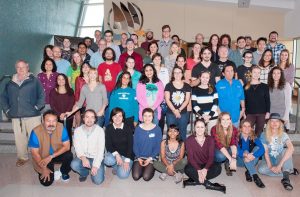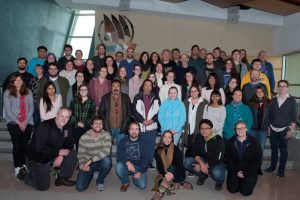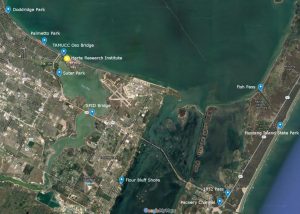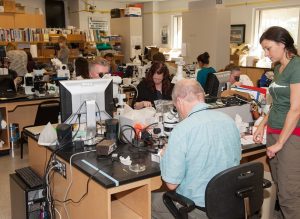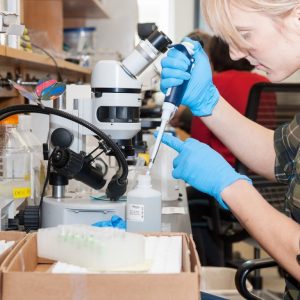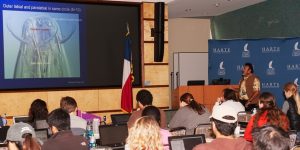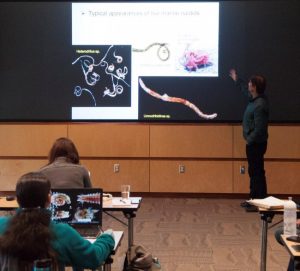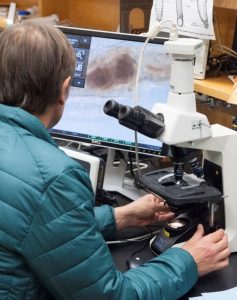Workshops Enhance Genetic Sequence Library for Benthic Marine Organisms
– DECEMBER 18, 2018
Nearly 100 scientists and researchers, including taxonomic and bioinformatics specialists, representing forty academic and research institutions, participated in genomics workshops held at the Harte Research Institute for Gulf of Mexico Studies, Texas A&M University – Corpus Christi. Participants at the January 2017 and 2018 workshops titled “Benthic Invertebrate Taxonomy, Metagenomics, and Bioinformatics” or BITMaB developed methodologies and infrastructure to use genetic markers for characterizing the taxonomic composition of benthic communities.
Benthic assessment studies and monitoring efforts based on genetic markers produce quicker results at lower costs than the labor-intensive morphological identification of individual benthic specimens. This is particularly important when immediate scientific results are required for informed decisions about issues following environmental disturbances, as happened after the Deepwater Horizon incident.
However, the lack of genetic sequences for many benthic meiofauna and macrofauna taxa limits the use of metagenomics techniques and contributes to poor taxonomic resolution of metagenomics analyses. One of the main workshop goals was to alleviate this problem by enhancing a reference library of genetic sequences from positively identified marine benthic organisms.
Students, staff researchers, and faculty interacted with the taxonomic experts and received training in techniques involved in metagenomics analyses. The workshops included field sampling (south Texas bays and Gulf of Mexico shorelines), laboratory processing and preservation of samples, and bioinformatics seminars. The seminars combined lectures and practical computer exercises that gave participants background information for the analysis of next- generation sequencing and metagenomics data and programming skills for the bioinformatics software programs BASH and QIIME.
The taxonomists provided comprehensive overviews and elaborated on the morphology, current taxonomic status and systematic classification, ecology, and natural history of the different organism groups. They gave presentations on Harpacticoida (benthic copepods), Sipuncula (peanut worms), Aplacophora (shell-less molluscs), flat worms, Nemertea (ribbon worms), Gastrotricha (hairy-bellied worms), Kinorhyncha (mud dragons), Tardigrada (eight-legged micro-animals), Gnathostomulida (jaw worms), Loricifera (tiny sediment-dwelling animals), Nematoda (round worms), Ostracoda (seed shrimp), Bivalvia (molluscs), Gastropoda (snails and slugs), Cumacea (hooded or comma shrimp), Tanaidacea (bottom-dwelling crustaceans), Oligochaeta (worms), and Polychaeta (bristle worms).
Workshop participants shadowed taxonomists to learn about different lab techniques, tailored to specific taxa, and the taxonomy of various benthic invertebrate taxa. Each taxonomist had their own lab station equipped with compound and stereo microscope for specimen identification. Participants identified specimens to the lowest taxonomic level possible and then transferred them into vials for subsequent genomic sequencing at the Smithsonian National Museum of Natural History.
The participants identified more than 360 benthic organisms from almost 100 taxa. The genomic data from these species will be crucial additions to the metagenomics reference library because most of the species had never been sequenced before.
Data from these workshops will be publicly available soon at the Gulf of Mexico Research Initiative Information and Data Cooperative (GRIIDC), doi: R5.x272.000:0001 and R5.x272.000:0002.
For more information about the workshops or for sequencing details, contact Michael Reuscher, Ph.D. (Michael.Reuscher@tamucc.edu) Ecosystem Studies and Modeling, the Harte Research Institute for Gulf of Mexico Studies, Texas A&M University – Corpus Christi.
The workshops were part of the Gulf of Mexico Research Initiative (GoMRI) research funded project “Genomic Responses to the Deepwater Horizon Event and Development of High- Throughput Biological Assays for Oil Spills,” The National Science Foundation also provided support for this effort.
Workshop organizers were W. Kelley Thomas (Principal Investigator, University of New Hampshire), Holly M. Bik (co-Principal Investigator, University of California, Riverside), Paul A. Montagna (co-Principal Investigator, Texas A&M University – Corpus Christi), Francesca Leasi (University of New Hampshire), Krystalynne Morris (University of New Hampshire), Jon L. Norenburg (Smithsonian Institution National Museum of Natural History), and Michael G. Reuscher (Texas A&M University – Corpus Christi).
************
The Gulf of Mexico Research Initiative (GoMRI) is a 10-year independent research program established to study the effect, and the potential associated impact, of hydrocarbon releases on the environment and public health, as well as to develop improved spill mitigation, oil detection, characterization and remediation technologies. An independent and academic 20-member Research Board makes the funding and research direction decisions to ensure the intellectual quality, effectiveness and academic independence of the GoMRI research. All research data, findings and publications will be made publicly available. The program was established through a $500 million financial commitment from BP. For more information, visit https://gulfresearchinitiative.org/.
© Copyright 2010-2018 Gulf of Mexico Research Initiative (GoMRI) – All Rights Reserved. Redistribution is encouraged with acknowledgement to the Gulf of Mexico Research Initiative (GoMRI). Please credit images and/or videos as done in each article. Questions? Contact web-content editor Nilde “Maggie” Dannreuther, Northern Gulf Institute, Mississippi State University (maggied@ngi.msstate.edu).

